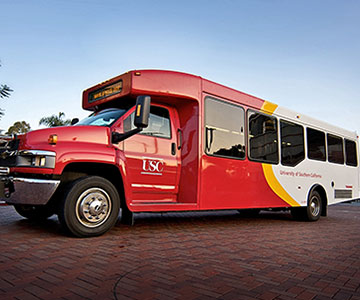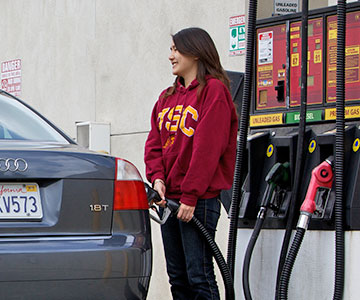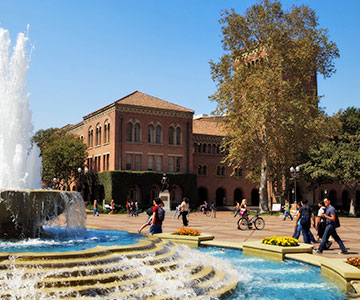USC Transportation recognizes the importance of meeting the transportation needs of the campus without compromising the health of our students, employees, or the environment. By initiating several efforts with our Transportation vehicles and attitudes we know we continue to search for new ways to cutting costs while going green.
UPDATE! USC’s 2024 Sustainability Progress Report for FY24, Assignment: Earth, is now available online here!
For more information on USC’s Sustainability Initiatives visit https://sustainability.usc.edu

Green Buses
Many of our buses operate on alternative fuels. We currently operate 23 bio-diesel buses.
Impact: Both Diesel is safer than gasoline because it is non-toxic and does not compromise those living in our community or the environment. Biodiesel fuel reduces toxin compounds by 75-85%.

Fuel Station
We offer B20 biodiesel fuel to our customers at the fuel station by the Parking Center.
Impact: B20 Biodiesel allows unmodified diesel engines to use alternative fuel without modifying the engine. Since biodiesel is not a fossil fuel it can cut greenhouse-gas emissions as well as ordinary pollutants (particularly soot) by displacing petroleum diesel fuel.

Carpool & Vanpool
Many USC Employees share the commute to USC’s campuses by participating in private vanpool or USC carpool programs.
Impact: Carpool and vanpool riders save money on gasoline, parking costs, vehicle maintenance, and insurance while helping reduce peak-period traffic congestion and emission pollution.

AQMD
The Clean Air Awards honor those “who have made a significant contribution to cleaner air through innovation, leadership and personal environmental commitment.” USC Transportation is proud to announce that our Average Vehicle Ridership for 2025 is 2.62, our highest ever result in a non-COVID year.

